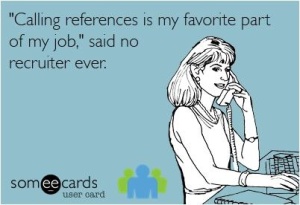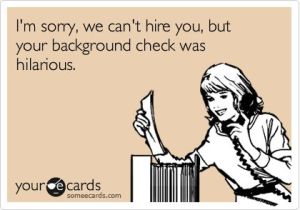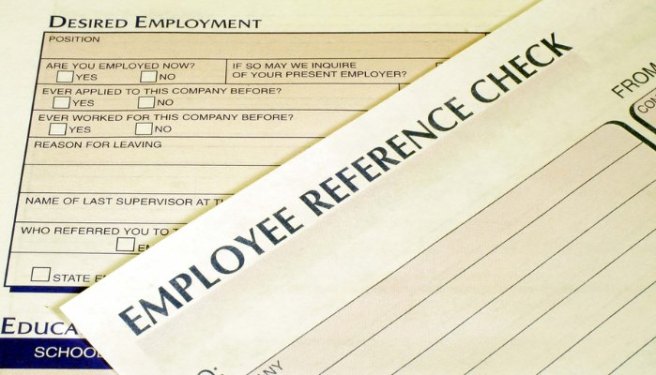I get it – the job searching process is tough. It can be hard to stay competitive with other candidates without totally losing your mind. The last thing most candidates usually worry about is their specified list of references. To be perfectly honest, I didn’t realize how important reference checks were until I was on the other side of the hiring process.
I used to think, “whats the point?” – 99% of reference checks come back positive. Eventually, I realized it wasn’t the references themselves that were important- it was the entire process. The way someone presents his or her references and openly communicates throughout the process can really give you a glimpse of what you are looking to know about the candidate.
The hiring process can be exhausting for all parties involved, so you want to make things as easy as possible for the hiring manager. Here are some tips and reminders ensure you are using your references to your advantage:
1. Did you read the application instructions?
First and foremost, I look to see if the candidate was diligent enough to read the application instructions. For example, most employers require at least one professional reference, if not more. If you list all personal references, I automatically assume that you either didn’t read the instructions or you simply don’t have a professional reference- both of which are pretty bad. As we all know, human resources associates and hiring managers are very busy during the hiring process. Applications are being screened, there are interviews taking place, and candidates are either being rejected or selected to move on to the next process. Reference checks usually take a backseat, and the last thing I want to be doing is contacting you to clarify information on your application or ask for additional references.

2. Did you provide a true professional reference?
To put it simply, a professional reference is someone who can vouch for your professional qualifications. This really should be a current or former employer (owner, manager, supervisor, etc.). I know it might be awkward to ask your current manager for a reference, so hopefully you left your previous job on good terms. I typically see a lot of candidates list colleagues, co-workers, and clients as “professional references.” While your previous co-worker might be able to attest to your ability report to work on time or thoughtfulness as a team player, you did not directly report to this person. The key to a good professional reference is to list someone who you previously reported to. Ideally, this person will be able to speak enthusiastically about your work behavior and accomplishments. If additional personal references are required, be sure to list people who are 1) not related to you, 2) not in a relationship with you, and 3) will speak highly of your character.
3. Did you check with your references first?
There is nothing more awkward than calling a candidate’s references and being met with complete shock. You should always check with your references before listing their phone numbers and emails for a potential employer. If you are going to list a previous employer, make sure you were at least with the company for long enough to be remembered (hopefully in a good way). I can’t even explain the number of times I have called previous employers that have no idea who the candidate is. Even worse, I have called previous employers that gave bad references. To be blunt- if you are not eligible for rehire, do not use someone from that company as a reference. As an HR associate, I am extremely thankful for references that aren’t afraid to be honest. If your previous manager says you had attendance issues and multiple disciplinary actions for your cell phone, it’s going to make me think twice about hiring you.
4. Did you provide the correct information?
This one seems pretty simple, but it is often overlooked. Double-check, maybe even triple-check the phone numbers and email addresses you list for your references. Incorrect phone numbers, voicemails that are full or have not been set-up, and mailer-daemons are not your friends when it comes to the hiring process. As I mentioned before, the reference check process is usually the last step in the hiring game. The sooner the hiring manager can contact your references, the sooner you’ll be out of “job limbo.”
5. Did you tell your references what position you were applying for?
Although you might not find this very important, it can certainly help your references stand out amongst the rest. Of course you want your references telling the recruiter great things about you, but it is even better if they are able to tailor your qualifications to the position. For example, if you are applying for a bank teller position, your references should be able to describe you as organized, good with numbers, and maybe even a people-person. In this case, the recruiter would not want to hear about how great of a cleaner you are, or how “working with children is truly your calling.” The recruiter is using your references to reaffirm the fact that you are in fact the right candidate for the job.

This list of pointers and recommendations could really go on and on, but the key points are simple. It’s usually a pretty good sign if the hiring manager has asked to contact your references. This means that the company has narrowed down the candidate pool to a select number of candidates and wants to find out more information about your character. If you didn’t already do so during the interview, now is your time to shine! Your references can really make or break your application, so choose them wisely. Always make sure your references show an accurate representation of your qualifications and your ability to act as a true professional.

